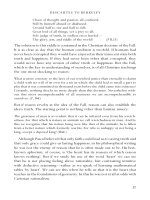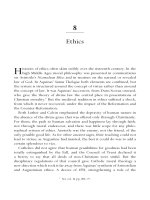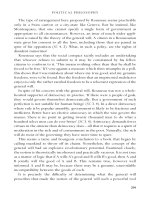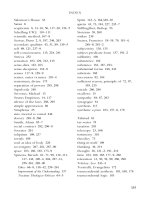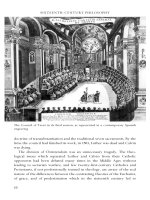The rise of modern philosophy a new history of western philosophy volume 3 (new history of western philosophy) ( PDFDrive ) (1) 120
Bạn đang xem bản rút gọn của tài liệu. Xem và tải ngay bản đầy đủ của tài liệu tại đây (22.78 KB, 1 trang )
HUME TO HEGEL
objective time sequence unless we had already established relationships
between causes and eVects.7
While Kant is hostile to empiricism, he attacks rationalism no less
vigorously. At the end of his analytic he insists that the categories cannot
determine their own applicability, the principles cannot establish their own
truth. Understanding alone cannot establish that there is any such thing
as a substance, or that every change has a cause. All that one can establish
a priori is that if experience is to be possible, certain conditions must hold.
But whether experience is possible cannot be established in advance: the
possibility of experience is shown only by the actual occurrence of experience itself.
The analytic shows that there cannot be a world of mere appearances,
mere objects of sense that do not fall under any categories or instantiate
any rules. But we cannot conclude from this that there is a non-sensible
world that is established by the intellect alone. To accept the existence of
extra-sensible objects that can be studied by the use of pure reason is to
enter a realm of illusion, and in his ‘transcendental dialectic’ Kant explores
this world of enchantment.
‘Transcendental’, as has been said, means something that goes beyond
and behind the deliverances of actual experience, and in his dialectic Kant
has three principal targets: metaphysical psychology, metaphysical cosmology, and metaphysical theology. ‘Pure reason’, he tells us, ‘furnished the
idea for a transcendental doctrine of the soul, for a transcendental science
of the world, and Wnally for a transcendental knowledge of God.’ In turn
he tests to destruction the three notions of an immaterial immortal soul, of
a surveyable cosmic whole, and of an absolutely necessary being.
Rationalist psychology, as practised by Descartes, started with the premiss
‘I think’ and concluded to the existence of a substance that was immaterial,
incorruptible, personal, and immortal. Kant argues that this line of argument is littered with fallacies—he lists four of them which he calls ‘the
paralogisms of pure reason’. These paralogisms are not accidental: in
principle, any attempt to go beyond empirical psychology must be guilty
of fallacy.
In order to dismantle a priori cosmology, Kant sets up four antinomies. An
antinomy is a pair of contrasting arguments which lead to contradictory
7 Kant’s account of the relation between time and causation is discussed in Chapter 6.
105

